
Breadcrumbs navigation
The latest in IR - spring book round up
Welcome to our quarterly book round up. Each quarter we bring you updates on the latest International Studies releases by BISA members. To be included in the next update contact Communications Manager, Chrissie Duxson: Chrissie.Duxson@bisa.ac.uk
A Century of State-Making in Iraq
Baghdad, Kurdistan, and the Development of the Constitution
Edited by Marianna Charountaki, James R Moore, Liam Anderson

Dr Marianna Charountaki is Senior Lecturer in International Politics, University of Lincoln, UK. She is also a convener of the BISA Foreign Policy Working Group.
Blurb
As an interdisciplinary publication, this book will have a strong international appeal to those across the Middle East who are interested in the complex issues of state-building, democratic transitions and federalism. It will also appeal to the many scholars in North America and Europe engaged in the study of these questions. The search for just and stable constitutional arrangements has been a central feature of political debates in the region and, since the Arab Uprisings, political scientists around the world have focused their attention on changes in the region. Iraq is a fascinating case study of a state that emerged from the mandate system with political institutions derived from Western political ideas, but one where the application of those ideas reflected the historical circumstances and social realities of fragmented community life.
Iraq’s political and constitutional problems have been fiercely debated since the Iraq war of 2003, with stuttering attempts to create a new constitutional settlement for Iraq. This book seeks to place these debates in their wider historical and socio-political context and demonstrate how contemporary problems are rooted in Iraq’s political system, state-building processes and unique constitutional past. The volume examines different aspects of Iraq’s struggle to create a coherent state identity through political institutions that can accommodate diversity. This is a topical work with extensive primary-source-based empirical research, alongside the conceptual and theoretical insights offered. Its different approach will be valuable to a variety of audiences, ranging from scholars and students of international politics/relations and law, diplomatic history, and the Middle East, to policymakers and, indeed, beyond to a broader audience of informed non-specialist readers.
Find out more and purchase the book via the Springer website.
The Global Third Nuclear Age
Clashing Visions for a New Era in International Politics
Andrew Futter, Ludovica Castelli, Cameron Hunter, Olamide Samuel, Francesca Silvestri, Benjamin Zala
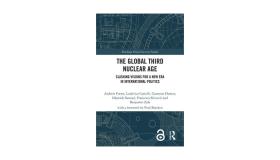
Andrew Futter is Professor of International Politics at the University of Leicester, UK. Ludovica Castelli is a PhD candidate at the University of Leicester, UK. Cameron Hunter is a postdoctoral researcher at the University of Copenhagen, Denmark. Olamide Samuel is a special envoy for the African Commission on Nuclear Energy (AFCONE). Francesca Silvestri is Teaching Fellow at the University of Leicester, UK. Benjamin Zala is Senior Lecturer in Politics and International Relations at Monash University, Australia.
Blurb
This book provides an in-depth examination of the technological, geopolitical and normative pressures driving the world into a new, more complex and potentially more dangerous Third Nuclear Age.
By adopting an innovative framework for analysis, the book challenges the constrained focus of much of the existing literature by explaining that the pathways to nuclear security for different actors across the globe will vary considerably in this new context. It argues that the Third Nuclear Age will be defined by friction and conflict between “Nuclear Traditionalists,” “Technological Transformers,” “Hedgers and Balancers,” and “Activists and Protestors,” as different interests and visions of the nuclear future clash. The book draws on dozens of interviews and non-English language sources to provide a global approach and looks at the security politics driving the political debate in 20 different countries across the globe.
This book will be of much interest to students of nuclear politics, security studies and International Relations.
Find out more and purchase the book via the Routledge website. There is also an open access version available.
The Road to War in Iraq
Comparative Foreign Policy Analysis
Chris Featherstone
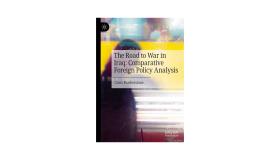
Chris Featherstone is Associate Lecturer in International Relations at the University of York.
Blurb
This book combines three Foreign Policy Analysis (FPA) models to explain both how and why the US and UK decided to invade Iraq in 2003. These three FPA models each examine a different but closely related aspect of the individual level of decision-making. Firstly, Groupthink examines how pathologies of small-group decision-making affected the processes in the US and UK decision to invade Iraq. Secondly, the Leadership Style framework examines how the individual leader’s style of exercising their leadership affected the navigation of the decision-making process. Thirdly, analogical reasoning examines how decision-makers frame their actions both in their own decision-making, and in how they present their decision to the wider public.
By achieving these objectives, “The Road to War” contributes to the field of FPA, and to our understanding of how the decision to invade Iraq was taken. The comparative use of these FPA models within a single framework means that this book responds to the calls for multifactorial research within FPA, proposing and testing a framework that provides more complex answers through adopting a multifactorial framework.
These more nuanced, complex answers then reveal more about the role of the individuals involved in the decision to invade Iraq, and how their cognition affected the process that led to the decision to invade.
Find out more and purchase the book via the Springer website.
Understanding Spanish Jihadist Terrorism
The Ideology Behind the Metaphors
Carlos Yebra López
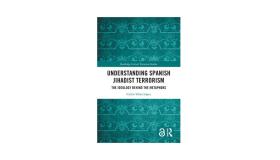
Carlos Yebra López is an Assistant Professor in Spanish Linguistics at California State University, Fullerton, USA. He has a PhD from New York University and is co-editor of Methodologies in Critical Terrorism Studies (2024).
Blurb
This book offers the first systematic account in English of the Spanish mass press coverage of ‘jihadist terrorist’ attacks in contemporary Spain.
Drawing upon a critical analysis of the ‘Spanish Transition to Democracy’ (1975–82) and ‘War on Terror’ narratives, it examines the ideology underlying the metaphors used in the Spanish mainstream press coverage of the terrorist attacks in Madrid (2004) and Barcelona (2017). The book shows how these metaphors were systematically deployed for propagandistic purposes that sought to ‘manufacture the consent’ of the Spanish population while obstructing public deliberation apropos the attacks, strengthening Spanish ‘democracy’ by defining it in opposition to ‘jihadist terrorism.’
This book will be of interest to students of Critical Terrorism Studies, Spanish Politics, Media Studies, and Security Studies.
Find out more and purchase the book via the Routledge website. Chapter 7 is freely available as a downloadable Open Access PDF.
Research Handbook on Cyberwarfare
Edited by Tim Stevens and Joe Devanny
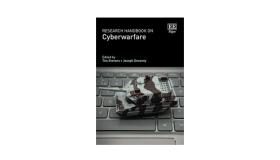
Tim Stevens is a Reader in International Security and Joe Devanny is a Lecturer in National Security Studies, Department of War Studies, King’s College London.
Blurb
This Research Handbook provides a rigorous analysis of cyberwarfare, a widely misunderstood field of contemporary conflict and geopolitical competition. Gathering insights from leading scholars and practitioners, it examines the actors involved in cyberwarfare, their objectives and strategies, and scrutinises the impact of cyberwarfare in a world dependent on connectivity.
The Research Handbook on Cyberwarfare interrogates cyberwarfare as a form of military intelligence statecraft that seeks to exploit digital systems for operational and strategic advantage. Chapter authors address cyberwarfare in its conceptual, historical, operational and strategic dimensions, and explore the application of international law, norms, ethics and arms control to this area of conflict. They pose crucial questions about the utility of cyberwarfare and its effects on society and citizens, establishing foundations for future research on the topic as a fact of international life.
Providing rich detail in an accessible and understandable manner, this Research Handbook is a vital resource for scholars and researchers of cyber conflict, international relations, and security studies. Its practical elements will also appeal to military and intelligence practitioners, as well as those interested in how cyberwarfare can be regulated to ameliorate its effects on society.
Find out more and purchase the book via the Edward Elgar Publishing website.
The Oxford Handbook of NATO
Edited by James Sperling and Mark Webber
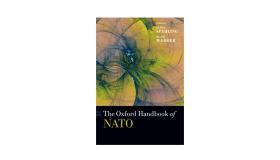
Mark Webber is Professor of International Politics at the University of Birmingham. He was Head of the School of Government at Birmingham from 2011 to 2019 and Chair/Honorary President of the British International Studies Association (BISA) from 2019 to 2023. He is a non-resident fellow at the NATO Defence College in Rome.
Blurb
The North Atlantic Treaty Organization (NATO) has since its foundation in 1949 been the principal body of the Western security order, and remains as important in the 2020s as it was in the 1950s. This Handbook offers the most extensive treatment of the Alliance published in the last two decades, providing detailed coverage of NATO allies, policies, and organizational structures. It brings together internationally renowned scholars who interrogate NATO's actions from historical, theoretical, and empirical perspectives.
The Handbook is divided into nine parts. Following an introductory part offering a thematic overview of NATO, framed by different approaches to domestic politics and global order, the second part explores three broad questions - what is NATO for, who is NATO for, and whither NATO? Part Three is more expressly theoretical, providing multi-perspectival analyses of the Alliance. Part Four then turns to how NATO works as a political-military alliance. Parts Five and Six are concerned with what NATO does in practical terms - how it addresses a wide range of security threats and what operations it has mounted in response. Part Seven looks at some of NATO's most significant allies including France, Germany, Italy, Poland, Turkey, the United Kingdom, and the United States. Part Eight, meanwhile, is concerned with partnerships and key relationships beyond NATO's membership - looking at Australia, Georgia, Ukraine, Russia, China, the European Union, and the European neutrals as well as ties to states in the Gulf, the Middle East, and North Africa. The final part of the volume offers reflections on NATO's recent past and possible lines of future development.
Find out more and purchase the book via the Oxford University Press website.
If you're a BISA member and you'd like your book included in next quarter's round up, email Communications Manager, Chrissie Duxson: Chrissie.Duxson@bisa.ac.uk. Please include the title, blurb and a link to where the book can be purchased. If you are able, you can also include details of any discount available, but of course this is not required. The book should have been published a maximum of six months prior to your email.
Top photo by Phil Hearing on Unsplash